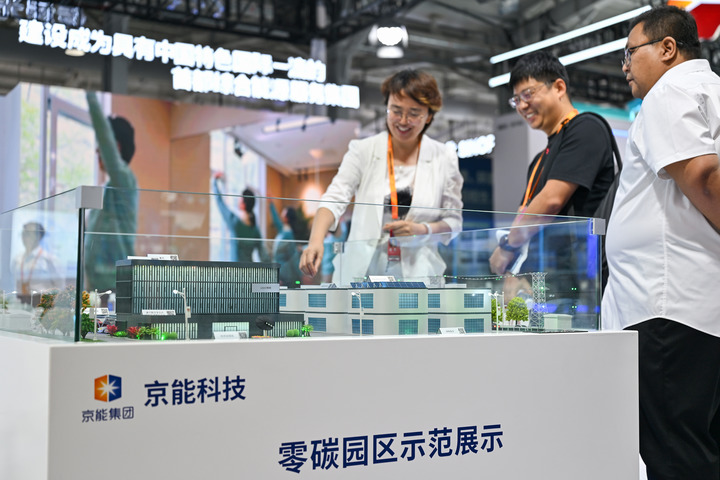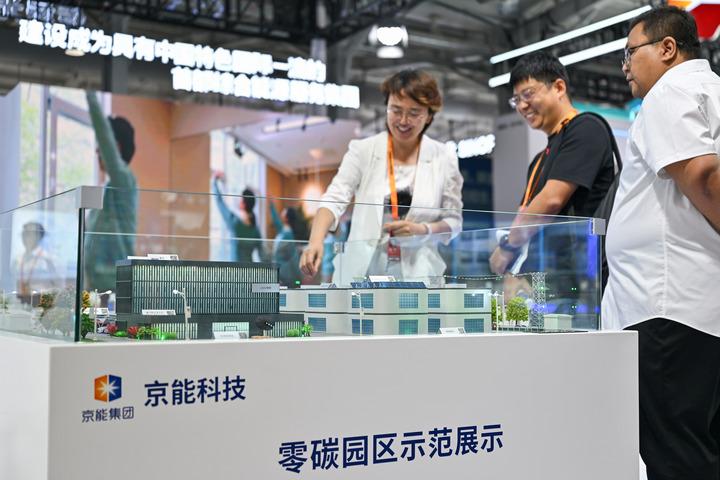
Visitors view a sand table model of a zero-carbon park at the 2025 China International Fair for Trade in Services (CIFTIS) in Beijing, capital of China, Sept. 12, 2025. (Xinhua/Li Xin)
BEIJING, Nov. 12 (Xinhua) -- China's Ministry of Commerce (MOC) issued recently guidelines to expand green trade, which, as the first targeted policy for the sector, highlighted innovation-led green trade development in the country.
In general, the document emphasizes the problem-solving orientation to solidify weak links in green trade development, offering targeted measures to strengthen corporate green and low-carbon development, unlock more carbon-reduction potential in logistics and enhance the incomplete support and guarantee systems.
-- Outlining priorities of four aspects
Four aspects are highlighted in the document to foster green trade, of which the first prioritizes improving green and low-carbon development capabilities of foreign trade businesses via more training, best practice cases promotion and green development awareness reinforcement.
Leading enterprises in foreign trade sector are encouraged to drive green and low-carbon transition in production and supply chains for foreign trade and green design and production will be promoted to reduce carbon emission of foreign trade products.
Regardless of others, a shift from road transport to railway or waterway transport will be advanced in long-distance transport to spur green logistics together with boosting environment friendly packages use and international mutual recognition and sharing of unit load devices (ULD).
In fostering import and export of green and low-carbon-related products and technology, the document comes up with developing trade of sustainable fuels including green hydrogen, exploring foreign trade of remanufactered products, and supporting enterprises to leverage preferential arrangements in free trade agreements to expand trade cooperation in green and low-carbon sector.
Moreover, green standards of exhibitions and import standards for renewable resources are to be improved together with deepening cooperation with Belt and Road partner countries in green and low-carbon field, promoting green and low-carbon development of overseas economic and trade cooperation zones and strengthening policy support and services for foreign-invested enterprises.
To foster a favorable international environment for green trade development, the document proposes participation in global consultations on carbon-related economic and trade rules, enhancement of exchanges on green and low-carbon development issues, and promotion of establishment of more inclusive and equitable international green trade rules.
Apart from boosting active participation in green issue negotiations under high-standard economic and trade agreements, the document also says to enhance quality of environmental chapters in free trade agreements. Formulating and releasing a batch of carbon footprint accounting standards for key foreign trade products are also mentioned in the document together with enhancing multilateral and bilateral mutual recognition cooperation in green and low-carbon qualification assessments.
On establishing and improving the green trade support and guarantee system, it proposes to strengthen financial policy support, enrich financial products and services based on carbon footprint accounting results of foreign trade products, and enhance export credit insurance coverage for green and low-carbon industries.
-- A clear path for action in sight
It is noteworthy that multiple regulators are working in concert to jointly outline a clear road-map for concrete implementation of the document.
Wang Peng, director of the department of energy conservation and comprehensive utilization of the Ministry of Industry and Information Technology (MIIT) said that industrial greening and product decarbonization form the foundation and pillars for green trade and implementing green design and advancing adoption of green manufacturing can lead to development of more eco-friendly products, accelerate industrial green transition, and inject new momentum into the expansion of green trade.
In next step, MIIT will further promote green design and green manufacturing and accelerate green transition and upgrading of the entire product life-cycle chain, from product design and manufacturing to usage, recycling, and circular utilization, noted Wang.
Wang Zhihua, head of the department of foreign trade at MOC, pointed out that a key priority at present is to help enterprises overcome actual obstacles and enhance their green competitiveness.
According to Wang, "enhancing services", "building platforms" and "setting examples" are the three aspects of significance to facilitate foreign trade businesses' capacity building, international market expansion and learning of advanced experience.
In addition, the People's Bank of China (PBOC) also outlined three aspects to back green services trade development. Firstly, PBOC will promote application of green finance and transition finance standards, and support innovation in financing means such as credit, bonds, and equity financing.
Secondly, it will encourage financial institutions to enhance financing support for production-related services such as R&D and design, logistics operations and maintenance, carbon emission certification and evaluation, and waste resource recycling, while lowering financing thresholds and costs for asset-light and green services trade enterprises.
Thirdly, it will support issuance of green financial products in global financial markets to offer global investors increased access to Chinese green assets. Via two-way opening-up of financial sector, PBOC intends to further empower innovative development in green services trade.
Experts said that amid global climate actions and efforts on green and low-carbon transition, China is actively expanding green trade, in a bid to facilitate trade optimization and upgrading, contribute to realization of "dual carbon" goals, and better serve global climate governance.
(Edited by Duan Jing with Xinhua Silk Road, duanjing@xinhua.org)




 A single purchase
A single purchase









